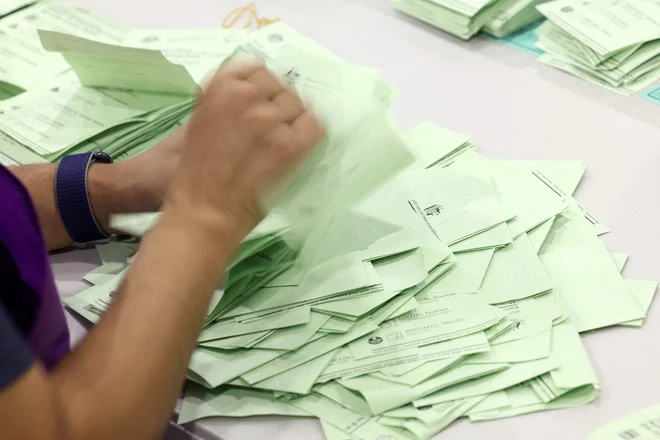Bank without Governor, Governor without a bank

Four Atlants, who support the balcony on the first floor of the Bank of Slovenia (BS), are centuries -old witnesses witnessing the vitality of the city center, which runs under their feet and inner life in the palace above their heads. The road changed its name. The owners of the building and users were changing. The hand was given different state formations. The mighty Atlants have been storming the storms of different crises. There is no doubt that they will not be affected by the current crisis, which breaks down their owner and resident.
Original is the word crisis meant decision but turning point. We express with her today Hard state, distress, dead point, difficult to solve but a breakup of balance. In BS, this is a severe state, distress and breakdown. The situation is not hopeless. It takes decisions that would be a turning point.
The public attention has attracted disagreement between the Prime Minister and the Prime Minister or the authority coalition regarding the choice of a new governor. We have been watching the game of power and blackmail from the beginning of the governorship. It doesn’t matter who the candidate is, it is important that it is ours. Political parties make it very clear to know each resident of the presidential palace. However, the power coalition seems to have done so in the most brutal and frank manner.
The public is disturbed by Slovenia that Slovenia has no representative in the European Central Bank Council (ECB). However, as a result, the decision -making of the ECB is not at risk, but cracks in the operation of BS as part of the ESCB, a single control mechanism, and a single rescue mechanism, in which he usually plays a performance role, may occur. BS itself is obstructed and endangered. Without a governor, it is pushed into an illegal state.
The decision on the deputy
BS has two organs: governors and the BS world (world). Governor’s powers are: 1. Business management and organizing work and representation of BS; 2. Execution of the Council’s Decisions and issue of individual and general acts of BS, which are not within the responsibility of the Council; 3. The governor may issue instructions for implementing the Council’s conclusions. The governor is also the president of the council. The governor may authorize one of the vice -preservers for the deputy governor. Thus, the Bank of Slovenia Act sets out, but does not explicitly determine what happens to this authorization after the expiry of the governor’s term.
I think it is undisputed that the decision on the deputy governor is a personal decision of the governor as a BS authority and that his decision is not equal to the appointment of the BS authority. Deputy Governor is not a BS authority. I conclude that the duration of the authorization is tied to the governor’s term. Therefore, the term of the deputy, who has the governor’s personal authority, cannot be longer than the governor’s term. When the governor expires, the authorization shall be terminated. Of course, the new governor can restore him. The law does not say anything about what is supposed to be the subject of authority and how long it should take.
Photo: Leon Vidic/Work
What shows us a comparison with the European Central Bank system? In the ECB world, the governor’s right to vote is exercised personally. The Rules of Procedure of the Council of the ECB stipulates that its member, which for a long time (for longer than one month) cannot be present at meetings, may appoint deputy as a member of the ECB Council. I think it is undisputed that this appointment is twice limited; For the first time, with the duration of the governor’s absence and the second with the termination of the governor’s term.
I wonder who, instead of the governor who ceases his mandate, he can accept acts on the organization and business of the BS or their changes. Who can propose the appointment of workers with special powers to the Council instead? Last but not least – who, for example, can ensure the operation of the Commission for Internal Violations?
So, if the governor is not named, the BS remains without an authority that performs certain tasks by law. The Council, the second BS body, is left without a president, but I suppose it can operate and decide on matters within its competence.
When is it formally assuming the function?
We continue to ask what will happen when the new governor is appointed. When is the named governor formally assumes function? You could say as soon as it is named. I don’t think that is true. The law stipulates that a member of the council, that is, a governor, after appointment, can only occur his function when he harmonizes his status with the provisions of the law relating to incompatibility. The coherence and appearance of the function of (new) governor is determined by the world on the proposal of the (old) governor. The Council must therefore first determine the possible incompatibility of performing function. If the Council determines the discrepancy, the governor must harmonize his status within three months of appointment, otherwise the decision on his appointment ceases. The fact that incompatibility is determined by and not before appointment is unusual. After being appointed and its status is harmonized, the signing of an employment contract follows. The Bank Personnel Rules follow the law, which stipulates that the governor performs his full -time function on the basis of an employment relationship with the bank, so he says that the governor occurs as a function on the day when he performs work on the basis of an employment contract he concludes with the bank. So the governor does not assume the function with the appointment, but by signing the employment contract. The personnel rules stipulate that the employment contract with the governor is signed on behalf of the BS by a Vice -Governor, who performs the function of a deputy governor, and sets the extreme deadline for taking office, three months after the election.
Even without the aforementioned, we have to deal with logical and legal inconsistency. If the deputy governor ceased to exist by terminating the mandate of the governor, as I explain, then there is no longer a person with the authority to sign legal acts on behalf of BS, ie the employment contracts of the new governor. For various reasons, the term of the Vice -Governor, who is a deputy, may also terminate, but there is no new governor yet.
In practice, this position can be solved in (at least) two ways.
The first way is the fiction of the extension of the powers, which has been present in the BS for many years and is reflected in the policy. Although the law does not provide for this, this internal act of BS, which is in fact its statute, assumes that the authority lasts after the termination of the governor, until the actual replacement of the governor, who can either deprive him or to reiterate the same vice -governer or other vice -borne. This may be practical, as it meets the saying « You want, you don’t want, you have to », but it is not in accordance with the law and can be challenged. But, « Where there is no plaintiff, no judge ».
In view of the previously written one, we do not know when the actual replacement is made: when the governor is appointed or when he signs an employment contract? If the date of appointment or date of publication in the Official Gazette may then be immediately authorized to re -authorize the old deputy or set a new one. But this can open a new debate, this time about integrity.
Another way is an institutional solution. The aforementioned rules adopted by the world can be changed and stated in it that the contract with the governor is signed by the longest -serving vice -governer, and not, as it says now, a Vice -General, who performs the function of deputy governor. Although it is unclear who runs the world after the governor ceases to terminate. The law does not mention the deputy chairman of the council, but how this is regulated in the internal acts of the bank is unknown. Although its current crisis is challenged by being pushed into a condition that can constitute a violation of constitutional principles, an emergency exit based on functional fiction of the extension of the authorization is not a real answer. The bank itself for too long, almost two decades, has tolerated it. Namely, the first Bank of Slovenia Act stipulated that it is appointed by the Deputy Governor by the National Assembly. His appointment, however, disappeared by a law passed in 2006, which became a faculty.
Proposal
Since I do not follow the saying that sin is to say, but not, I will end with the finding that the Ministry of Finance should propose changes to the BS law that would regulate its work in emergency, in conditions where there is no current succession in the governor, and precisely determine the extent and duration of the powers. The law provides for an emergency that arises if the proposed candidate for a member of the Bank of Slovenia, ie a candidate for the governor, does not receive the necessary majority of parliamentary votes. However, it is satisfied by imposing the President of the National Assembly that he immediately informs the President of the Republic, who must inform her within 14 days his decision on the further procedure for election. This law coincides with the third emergency. The problem is no longer acute, but it becomes chronic. Extraordinary conditions will continue to occur, so it would be useful to study opportunities to improve the current process of selecting and appointing governor and vice -preservers. Better late than never. Otherwise, we will be dealing with the latent crisis of the institution.
Appointments should be derived in a timely manner. Politicians, however, need to be aware of their responsibility and constructively talk and negotiate.
For comfort, this is this. We forgot that the choice of the first ECB Cow’s first president was a bargain that took place before the eyes of the whole of Europe. However, it allowed it to start its operation. The mixer process can be a compromise in the style of wolf sit and goat whole, but it is not necessarily a lasting solution.
***
Ddr. Neven Borak, economist and historian
The article is the opinion of the author and does not necessarily express the position of the editorial board.








